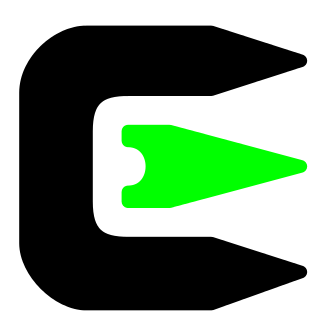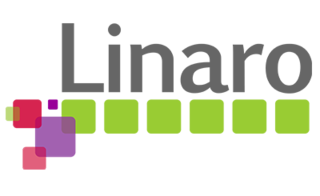The GNU toolchain is a broad collection of programming tools produced by the GNU Project. These tools form a toolchain (a suite of tools used in a serial manner) used for developing software applications and operating systems.
The GNU toolchain plays a vital role in development of Linux, some BSD systems, and software for embedded systems. Parts of the GNU toolchain are also directly used with or ported to other platforms such as Solaris, macOS, Microsoft Windows (via Cygwin and MinGW/MSYS), Sony PlayStation Portable (used by PSP modding scene) [1] and Sony PlayStation 3. [2]
Projects included in the GNU toolchain are:

Cygwin is a Unix-like environment and command-line interface for Microsoft Windows. Cygwin's purpose is expressed in its motto: "Get that Linux feeling – on Windows".
An integrated development environment (IDE) is a software application that provides comprehensive facilities for software development. An IDE normally consists of at least a source-code editor, build automation tools, and a debugger. Some IDEs, such as IntelliJ IDEA, Eclipse and Lazarus contain the necessary compiler, interpreter or both; others, such as SharpDevelop, NetBeans do not.

The GNU Autotools, also known as the GNU Build System, is a suite of programming tools designed to assist in making source code packages portable to many Unix-like systems.
A cross compiler is a compiler capable of creating executable code for a platform other than the one on which the compiler is running. For example, a compiler that runs on a PC but generates code that runs on an Android smartphone is a cross compiler.

DJ's GNU Programming Platform (DJGPP) is a software development suite for Intel 80386-level and above, IBM PC compatibles which supports DOS operating systems. It is guided by DJ Delorie, who began the project in 1989. It is a port of the GNU Compiler Collection (GCC), and mostly GNU utilities such as Bash, find, tar, ls, GAWK, sed, and ld to DOS Protected Mode Interface (DPMI). Supported languages include C, C++, Objective-C/C++, Ada, Fortran, and Pascal.
MinGW, formerly mingw32, is a free and open source software development environment to create Microsoft Windows applications.
Newlib is a C standard library implementation intended for use on embedded systems. It is a conglomeration of several library parts, all under free software licenses that make them easily usable on embedded products.
Nios II is a 32-bit embedded processor architecture designed specifically for the Altera family of field-programmable gate array (FPGA) integrated circuits. Nios II incorporates many enhancements over the original Nios architecture, making it more suitable for a wider range of embedded computing applications, from digital signal processing (DSP) to system-control.
The MicroBlaze is a soft microprocessor core designed for Xilinx field-programmable gate arrays (FPGA). As a soft-core processor, MicroBlaze is implemented entirely in the general-purpose memory and logic fabric of Xilinx FPGAs.

The GNU Binary Utilities, or binutils, are a set of programming tools for creating and managing binary programs, object files, libraries, profile data, and assembly source code.
LatticeMico32 is a 32-bit microprocessor reduced instruction set computer (RISC) soft core from Lattice Semiconductor optimized for field-programmable gate arrays (FPGAs). It uses a Harvard architecture, which means the instruction and data buses are separate. Bus arbitration logic can be used to combine the two buses, if desired.
The Java Development Kit (JDK) is a distribution of Java technology by Oracle Corporation. It implements the Java Language Specification (JLS) and the Java Virtual Machine Specification (JVMS) and provides the Standard Edition (SE) of the Java Application Programming Interface (API). It is derivative of the community driven OpenJDK which Oracle stewards. It provides software for working with Java applications. Examples of included software are the Java virtual machine, a compiler, performance monitoring tools, a debugger, and other utilities that Oracle considers useful for Java programmers.
DJGCC is a C development suite for x86 PCs that runs under DOS or compatibles. It is guided by DJ Delorie, who started the project in 1989. It is a port of the popular gcc compiler.

Linaro is an engineering organization that works on free and open-source software such as the Linux kernel, the GNU Compiler Collection (GCC), QEMU, power management, graphics and multimedia interfaces for the ARM family of instruction sets and implementations thereof as well as for the Heterogeneous System Architecture (HSA). The company provides a collaborative engineering forum for companies to share engineering resources and funding to solve common problems on ARM software. In addition to Linaro's collaborative engineering forum, Linaro also works with companies on a one-to-one basis through its Services division.
Mbed is a development platform and real-time operating system (RTOS) designed for internet-connected devices that utilize 32-bit ARM Cortex-M microcontrollers. These internet-enabled devices are often categorized under the Internet of Things (IoT) umbrella. The Mbed project is a collaborative effort led by Arm Holdings, in partnership with various technology companies and contributors.
Mingw-w64 is a free and open source software development environment to create (cross-compile) Microsoft Windows PE applications. It was forked in 2005–2010 from MinGW.

Buildroot is a set of Makefiles and patches that simplifies and automates the process of building a complete and bootable Linux environment for an embedded system, while using cross-compilation to allow building for multiple target platforms on a single Linux-based development system. Buildroot can automatically build the required cross-compilation toolchain, create a root file system, compile a Linux kernel image, and generate a boot loader for the targeted embedded system, or it can perform any independent combination of these steps. For example, an already installed cross-compilation toolchain can be used independently, while Buildroot only creates the root file system.